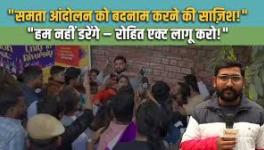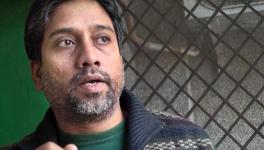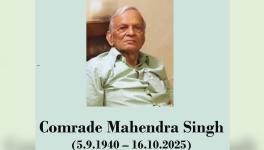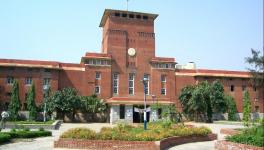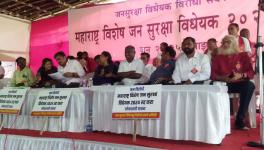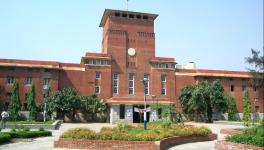Activists Demand Immediate Release of G N Saibaba
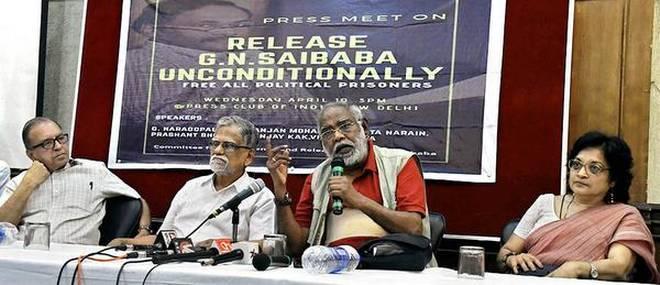
Image Courtesy: The Hindu
The Committee for the Defence and Release of Dr G.N. Saibaba came together on Wednesday demanding the Delhi University professor’s “immediate release on bail”. Stating that Saibaba, who has been languishing in Nagpur Central Jail – “convicted in March 2017 for the “crime” of speaking truth to power” – is suffering from severe health issues due to the lack of medical care being provided to him. Several activists, professors and his family members have appealed for his immediate release.
Saibaba is a prisoner who is wheelchair-bound due to post-polio paralysis that rendered him 90% disabled early on in life. The panel stated that years of incarceration, the oppressive prison routine and the failure of the authorities to provide to him the proper medical care have severely impaired him bodily. Even before his trial, he was diagnosed with maladies in the pancreas and gallbladder necessitating immediate surgery, which could not be performed due to his conviction.
His situation ever since has only worsened. He has developed spinal problems and kidney ailments as well. “I have been experiencing unbearable pain in my damaged muscles of the left hand, frequent and complete blackouts, round the clock dizziness and heavy pressure in my brain, and sleeplessness due to the shooting pain. The drugs have turned ineffective. Even sedatives have stopped working on me now,” wrote Saibaba, a month back from his confines.
Speaking at the event, the professor’s wife, Vasantha Kumari, said, “He is suffering from 19 ailments and the jail authorities are not even providing him with basic facilities. The wheelchair provided to him was a broken one and we had to send a new one. In prison, he is being subjected to mental torture. We had hoped we will get justice, but even the last bail plea got rejected.”
His wife Vasantha Kumari, had filed an affidavit stating that prison authorities were not giving him the prescribed doses of life-saving medicines and that the necessary facilities needed for any semblance of a treatment were grossly inadequate in Nagpur. Advocate Mihir Desai argued as to how ill-equipped the prison authorities were to give him the necessary treatment. The judges, however, still relied on the reply filed by the prison authorities in which they said Professor Saibaba was getting “adequate” treatment.
The Nagpur Bench of Bombay High Court thereafter refused to suspend the sentence of Professor G N Saibaba on March 26. This is despite strong and unequivocal appeals for his release even by a group of prominent UN rights experts including special rapporteurs Catalina Devandas, Michel Forst, Dainius Pūras and Nils Melzer, who in their statement, highlighted that Saibaba was “now in urgent need of adequate medical treatment”.
Committee chairman G Haragopal said, “The current situation is extremely frightening. Mr. Saibaba’s case is a blot on the democratic society and democratic India. Inside the prison, he is living under inhumane circumstances. It is unfortunate that the executive is constantly misleading the judiciary. Can a person be convicted because of his conviction and belief?”
Stating that there has been a “decline and fall of the judiciary”, human rights activist John Dayal said, “He is being denied basic medical care. What is the human dignity left in him? How can jail authorities and doctors who are attending to him stay silent and see the man wither away?”
Activists present said that in a recent letter written by Mr. Saibaba from the prison, the professor has expressed concerns over “whether he will survive the third summer in the prison”. He also said that “I am half dead by now” in the same letter.
Vikas Gupta, professor from the History Department, Delhi University, said, “Democratic states are a social contract where citizens come together. Here, we are increasingly seeing a tendency where people are put behind bars before they can prove their innocence. Rather than expediting the judicial process, people are charged under draconian laws and put behind bars.”
Film-maker Sanjay Kak said, “The government’s target is now very clear. The State’s enemies are those who talk about the issues which the government in power wishes to overlook. We have to unite and refuse to be scared. Saibaba through his writings and poetry from within the prison is converting darr into samajh (fear into understanding)”.
The committee also read out one of the poems written by Mr Saibaba from his jail cell which reads:
I refused to Die
Again, when I refused to die
tired of my life
my captors released me
I walked out
into the lush green valleys under the rising sun
smiling at the tossing blades of grass
Infuriated by my undying smile
They captured me again
I still stubbornly refuse to die
The sad thing is that
They don't know how to make me die
Because I love so much
The sounds of growing grass
- Dr GN Saibaba
(from his jail cell)
Also read: No Release for Prof G N Saibaba as Bombay HC Refuses to Suspend Sentence
Get the latest reports & analysis with people's perspective on Protests, movements & deep analytical videos, discussions of the current affairs in your Telegram app. Subscribe to NewsClick's Telegram channel & get Real-Time updates on stories, as they get published on our website.









